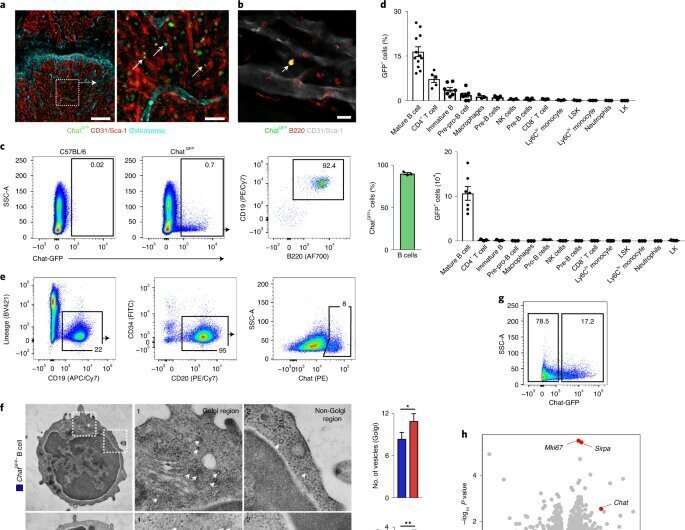Immune cells produce chemical messenger that prevents heart disease–related inflammation

The immune system's white blood cells, which are produced in the bone marrow, mostly help to defend against bacteria and injury, but sometimes they can turn against the body—for example, in cardiovascular disease, their inflammatory aggression can harm arteries and the heart. New research in Nature Immunology that was led by investigators at Massachusetts General Hospital (MGH) provides insights into the pathways that increase or decrease the bone marrow's output of these cells. The findings may lead to new treatments for conditions that arise when the balance of white blood cell production goes awry.
Senior author Matthias Nahrendorf, MD, Ph.D., an investigator in MGH's Center for Systems Biology and The Richard Moerschner professor at the MGH Research Institute and Harvard Medical School, explains that the nervous system plays a role in controlling blood cell production through chemical messengers or neurotransmitters. "This is for instance important in people exposed to stress, where stress hormones—part of the 'fight-or-flight' response controlled by the sympathetic nervous system—may increase bone marrow activity and cardiovascular inflammation in response to the neurotransmitter noradrenaline," he says. The sympathetic nerves have a counter player—the parasympathetic nerves, which slow down responses and bring about a state of calm to the body, mainly through the neurotransmitter acetylcholine.
Because acetylcholine can have a protective effect against inflammation and heart disease, the researchers studied this neurotransmitter in the bone marrow. "When we looked into how acetylcholine acts on the production of blood cells, we found that it does the expected—it reduces white blood cells, as opposed to noradrenaline, which increases them," says Nahrendorf. "What was unexpected though was the source of the neurotransmitter acetylcholine."
The team found no evidence in the bone marrow of the typical nerve fibers that are known to release acetylcholine. Instead, B cells, which are themselves a type of white blood cell (most known for making antibodies), supplied the acetylcholine in the bone marrow. "Thus, B cells counter inflammation—even in the heart and the arteries—via dampening white blood cell production in the bone marrow. Surprisingly, they use a neurotransmitter to do so," says Nahrendorf.
Tapping into this process may help investigators develop strategies to block inflammation in cardiovascular conditions such as atherosclerosis. "Ultimately this may lead to new therapeutics that combat myocardial infarction, stroke, and heart failure," says Nahrendorf.
More information: Maximilian J. Schloss et al, B lymphocyte-derived acetylcholine limits steady-state and emergency hematopoiesis, Nature Immunology (2022). DOI: 10.1038/s41590-022-01165-7




















